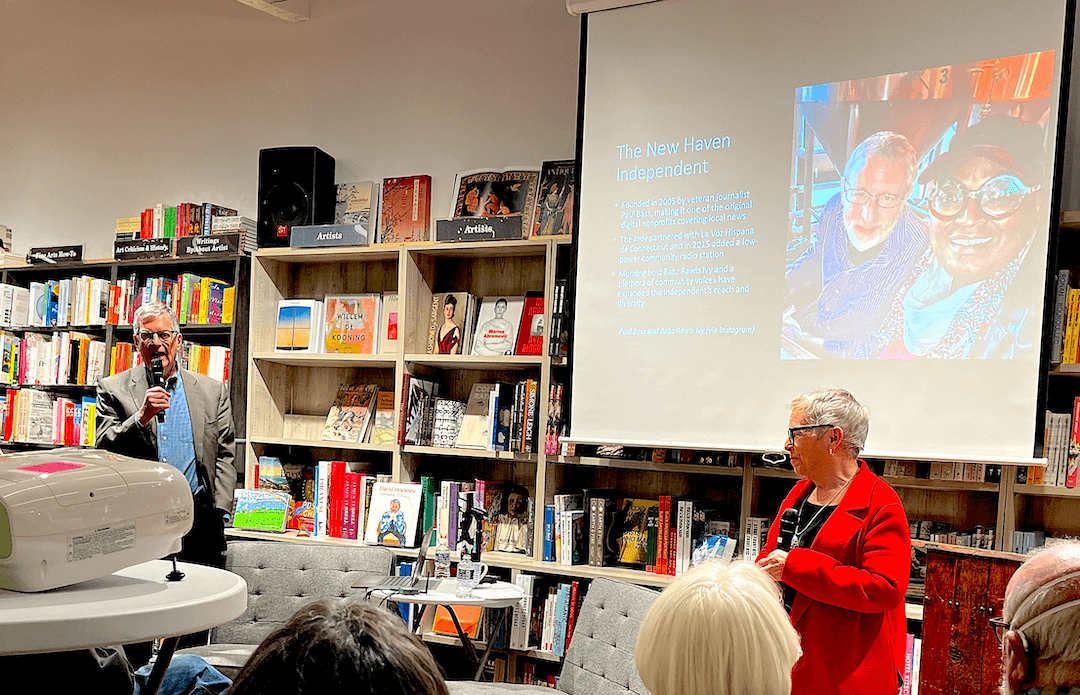In 2004, Dan Gillmor published “We The Media,” one of the most useful early guides to the new world of news.
Gillmor described how digital technology had altered the media landscape and reported how people he characterized as “the former audience” were beginning to use that technology to produce journalism themselves.
Fast forward a couple of decades and two new books are doing likewise across a media scene far more dramatically transformed than the one documented by Gillmor.
Since 2005, some 2,900 U.S. newspapers have gone out of business and 43,000 journalists have lost their jobs, according to a study by the Medill School of Journalism at Northwestern University. About half the nation’s 3,143 counties have only one news outlet, and 203 have none.
What’s most valuable about the books by Ellen Clegg and Dan Kennedy (“What Works in Community News”) and Brant Houston (“Changing Models for Journalism”) is their clear-eyed account of what’s emerging in the face of all that loss.
The group Gillmor called “the former audience” now includes a lot of people formerly employed by established news companies, many of which no longer exist. So in addition to telling the stories of everyday people trying their hand at news, Clegg and Kennedy focus substantial reporting on those “formerly employed” stepping into the world of startup news initiatives.
Houston, the Knight Chair in Investigative Reporting at the University of Illinois, spends a chapter recounting “what happened to traditional journalism,” but devotes the bulk of his book to the tools, techniques and trends at work in journalism initiatives big and small.
These books are important for two main reasons.
In practical terms, they are essential reading for anyone considering a news startup. For most people, journalist or not, launching a news venture without consulting these volumes invites the sort of outcome awaiting a novice cook attempting a French feast sans recipe.
More broadly, the recent history recounted by these authors should be required reading for any journalist aspiring to the kind of more-than-just-the-news literacy espoused earlier this month by David Cohn.
Clegg, the retired opinion editor of The Boston Globe, and Kennedy, a journalism professor at Northeastern University and a former staffer at The Phoenix, the Boston alternative weekly that closed in 2013, spell out their central theme in the title of their book’s introduction: “The Local News Crisis Will Be Solved One Community At A Time.”
Dan Kennedy and Ellen Clegg discuss their book “What Works in Community News” at Brookline Booksmith, a bookstore in Brookline, Mass., on Jan. 9, 2024. (Courtesy: Bill Mitchell)
Among the smallest initiatives they document is The Bedford Citizen, a volunteer project launched in 2012 by three members of the League of Women Voters dissatisfied with the coverage of town government and community events provided by the local chain-owned weekly.
A dozen years later, with the help of a professional fundraiser who lived in the community, the Citizen has developed a range of revenue streams and has supplanted Gannett’s Bedford Minuteman as the town’s primary source of news and information. (Gannett closed the print edition of the Minuteman in 2022, its surviving online site among more than 100 Massachusetts towns receiving once-over-lightly coverage by Gannett’s Wicked Local.)
In exploring the roots of the ventures it profiles, “What Works” sheds light on the ways digital media’s greater flexibility can address a range of community needs — and benefit from new ways of doing news.
Clegg and Kennedy tell the story of “MLK 50: Justice Through Journalism,” the Memphis site that makes clear its mission with its name. In a piece celebrating the site’s seventh anniversary April 4, founder Wendi Thomas noted the impact of a 2019 investigation she did into the aggressive debt collection practices of a Memphis health care system.
The “Profiting from the Poor” series, which won the prestigious Selden Ring Award for investigative reporting, was produced in partnership with ProPublica’s Local Reporting Network.
That sort of collaboration is one of the key approaches highlighted by both books, along with nonprofit funding, solutions journalism and university journalism programs creating news operations of their own.
Another form of collaboration undertaken by several of the sites profiled is an affiliation with Newspack, a service that provides a WordPress site and a wide range of shared services for 230 startups of various size and mission.
In exploring the nonprofit model, Houston advises “diverse streams of revenue, meaning that if one source of funds dries up, others can fill in the budget gap.”
He lists a dozen revenue sources that sites should consider, including memberships, events, advertising, crowdfunding and government funding, among others. Unless I missed it, though, neither Houston nor Clegg and Kennedy examine a source of local funding I believe could generate significant cash for local news sites: marketing services aimed at local businesses struggling to survive in the digital age.
A nonprofit site I helped to start and run from 2012 to 2015 in Detroit produced significant results from such services, along with consequential neighborhood news coverage. Detroit143 ultimately failed for a variety of reasons, but I continue to believe that small business marketing has potential for local news startups.
As is fitting for a book about innovation, Clegg and Kennedy have used it as the peg for a range of readings, discussions, a podcast and a workshop — all “spokes,” as Kennedy described the events to The Boston Globe, “where the book is the hub of the wheel.”
The podcast produced by Clegg and Kennedy now includes 77 episodes, prompting this review from a listener via Apple Podcasts:
In 2022 my wife and I suddenly found ourselves purchasing and owning a weekly newspaper in rural Idaho. We have no background or training in journalism and this podcast has been a significant part of my education about the industry and what other small outlets are doing to solve some of the same problems we face. Highly recommend.
The podcast, including the authors’ 45-minute chat with Houston (Episode 60), is also useful for journalists stepping into the startup world.
If you’re interested in learning how to pursue local investigative reporting with limited resources, how small newsrooms can make smart use of artificial intelligence and how journalism educators might think of their schools as “teaching hospitals,” their conversation with Houston will be worth your time.
Among the most useful events inspired by “What Works” was a workshop last month at Northeastern University focused on the future of local news. An eager audience of about 100 journalism entrepreneurs and educators ate up an impressive array of ideas you can use.
At lunchtime, I grabbed my free chicken Caesar wrap and plopped down next to Bob Sprague, a longtime journalist who founded Your Arlington in 2006 after reading Gillmor’s 2004 book.
“I let Dan know what we were doing,” Sprague told me, “and he sent me a donation!”
Whether or not they have their checkbooks handy, I’m betting Clegg, Kennedy and Houston will be hearing from similarly grateful readers in the years ahead.



